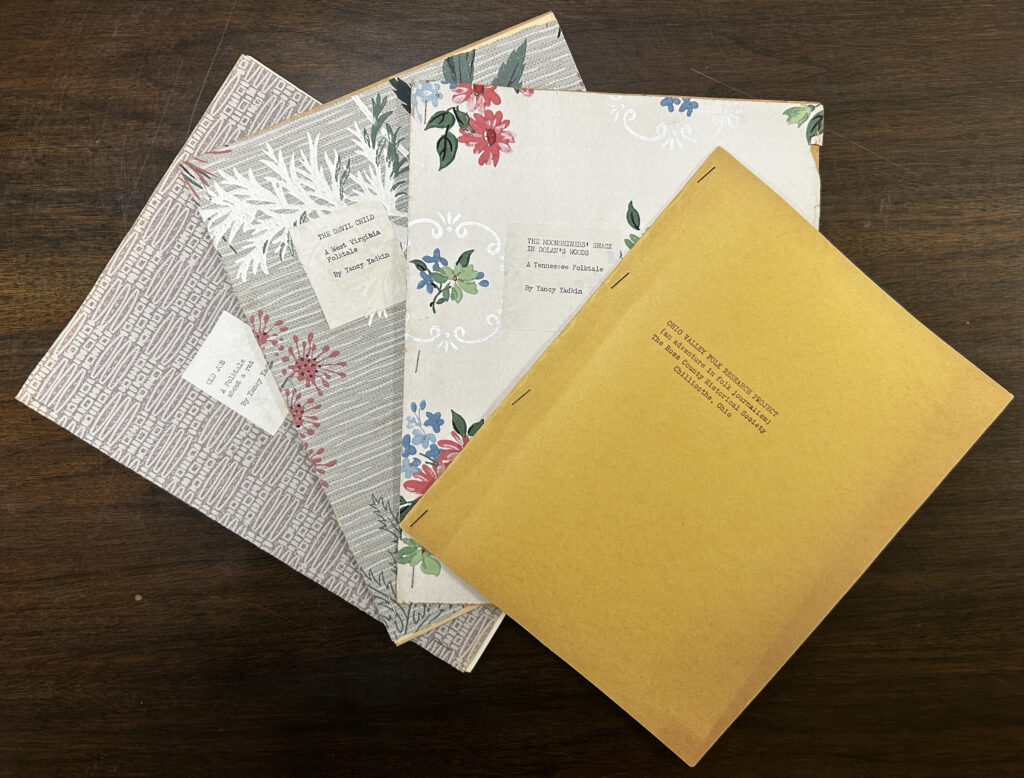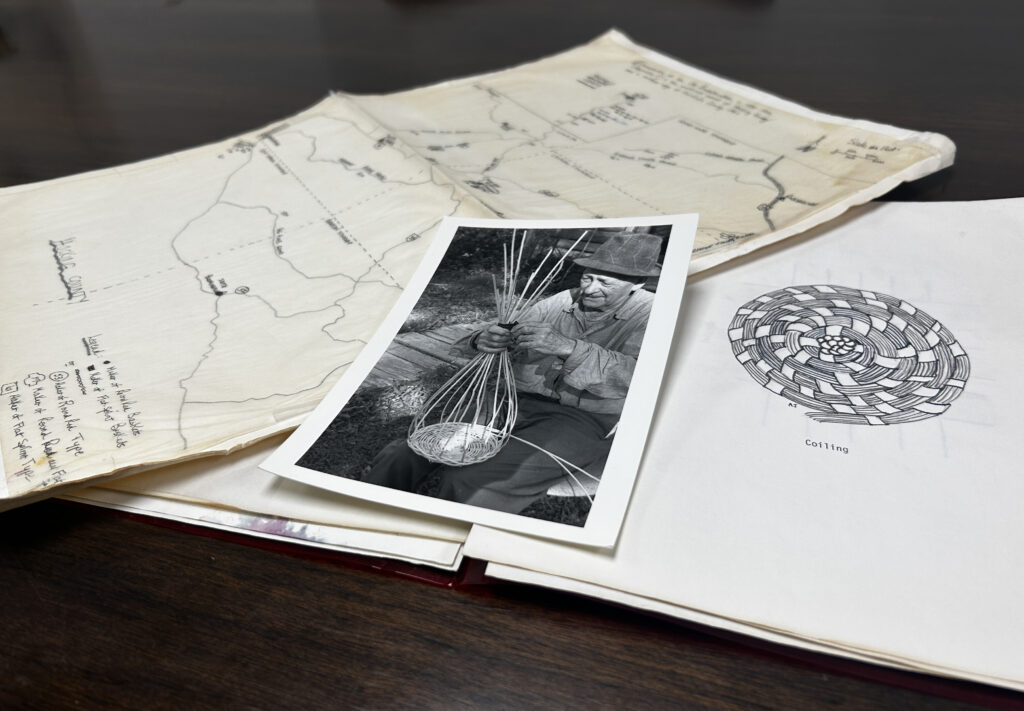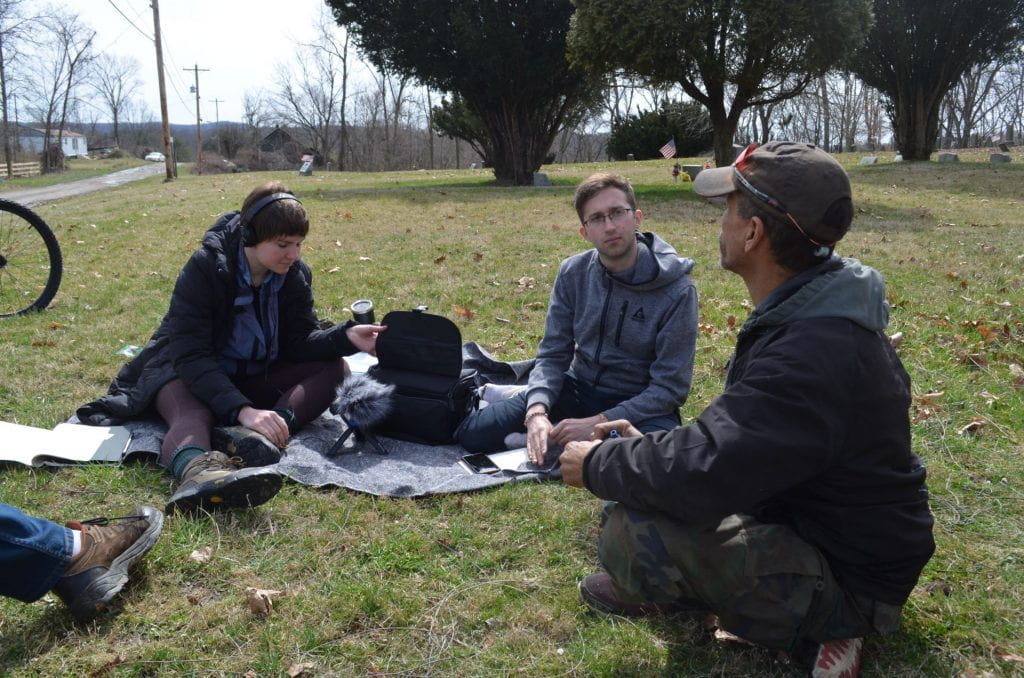This article appeared in the Volume 4, Issue 3 Winter 2024 issue of the Appalachian Curator. Click here to view a PDF of the full issue.
by Jasper Waugh-Quasebarth, Archivist, OSU Center for Folklore Studies
The Folklore Archive of the Center for Folklore Studies at The Ohio State University is a repository of international and regional folklore, regional history, and expressive culture comprised of twenty-three main collections stemming from the ethnographic and text-based research of faculty, students, and professional folklorists of the university. As an extension of the university’s land-grant mission, the Folklore Archive seeks to serve Ohio counties through the documentation, preservation, and application of folklore materials. With thirty-three counties (over a third of Ohio’s counties) within the bounds of the ARC regional designation and a historical focus on Appalachian in Folklore Studies, the archive contains a trove of information collected on Appalachian folk culture. As part of our current efforts to further develop and generate collections of Appalachian folklore, this article aims to introduce our existing collections to researchers, educators, artists, and activists of Appalachian Ohio, Kentucky, West Virginia, and beyond in hopes of sparking future collaboration.
The Folklore Archive houses collections of ethnographic materials, ephemera, grey literature and media related to folklore in a broad sense. Public and academic folklorists affiliated with the Center as well as student pursuing coursework and research in folklore at the undergraduate and graduate levels have been the primary collectors. As a result, collections are deeply individualized to the theoretical, geographic, and methodological interests of collectors.
As the onetime home of the Ohio Folklore Society and the American Folklore Society, the Folklore Archive became a repository for the ethnographic materials and publications of public folklorists working in Ohio from the mid to late 20th century. The Center for Folklore Studies Collection (CFS) has materials related to the organization of the Ohio Folklore Society and the grassroots connections between folklorists working in Appalachian Ohio, who saw the region as a wellspring of folkloric material in its musical, craft, and occupational traditions. From 1977 to 1982, the Ohio Arts Council funded field research into traditional music forms, industrial occupational folklore, craft and folk art, and religious practice,

resulting in manuscripts, tapes of interviews and performances, and photographs, much of which has been digitized. This collection (OAC) also contains a digitized version of the film Simple Gifts: Aspects of Ohio Folklore (1972) and Say Amen: Portraits of Southern Ohio Folklife (1983), which arose from public folklore research in the state. Additionally, the archive hosts a near-complete collection of the publications of the Ohio Valley Folk Research Project (OVF). This project collected folk narratives of place, foodways, and music throughout the Ohio River Valley, publishing wallpaper-bound copies through the Ross County Historical Society from the early 1950s through the 1960s.
Through independent research, faculty and staff of the university generated collections related to Appalachia. The Francis Lee Utley Record Collection (URC) consists of commercial recordings imprinted on disc media from the early to mid 20th century, including rare recordings and album art. From popular media dealing in stereotypical images of Appalachian folk music to rare anthologies of activist music, the collection demonstrates the breadth and diversity of Appalachian commercial folk recordings. The Hank Arbaugh (HA) collection developed in collaboration with faculty and students contains recordings, ephemera, and illustrations of the Central and Southern Ohio traditional music community as documented by Columbus-based musician Hank Arbaugh. The Patrick B. Mullen Collection (PM) contains materials collected during his fieldwork with the American Folklife Center while working on the 1978 Blue Ridge Parkway Folklife Project.

The Rosemary Joyce Collection (RJ) is made up of photographs, fieldnotes, maps, and other fieldwork materials stemming from her fieldwork with artisans in Southeast Ohio in the mid to late 20th century. Center for Folklore Studies staff, students, and affiliates also generated the Appalachian Studies Network Collection (ASN) which documents the educational, economic, social, environmental and political factors that influenced Appalachian students in their decisions to attend college at Ohio State from 2011-2015. The collection contains interviews with students and information collected in site visits to twelve counties in Appalachian Ohio.
Through their coursework, students have produced most of our archival holdings. Reflecting an earlier methodology of only collecting discrete units of generic folklore, the Genre Card Collection (GRC) contains instances of genres of folklore (proverbs, sayings, practices, recipes, etc.) often attributed to specific people and places from the mid 20th century, many from Appalachia. With a turn in Folklore Studies toward context and performance, student projects generated in folklore classes began to include full interviews, transcripts, photographs, and reports, which comprise the Student Ethnographic Projects Collection (SEP). This collection contains contributions from over 11,000 students from 1967 to today. This original research covers a vast area of topics related to Appalachia, including place-based legends, ghosts and cryptids, migration, music, foodways, family life, mining, and storytelling usually focused on Appalachian Ohio, Kentucky, and West Virginia.

Finally, our ongoing service ethnographic methods project, The Ohio Field School (OFS), continues to generate archival holdings around the questions related to changing environment and place in Appalachian Ohio. Based on seven years of collaborative fieldwork with community grassroots organizations, the collection contains interviews, photographs, ephemera, and field reports generated by graduate and undergraduate students in collaboration with community partners.
With diverse collection practices comes diverse challenges to access, digitization, and organization. The CFS Folklore Archives is in the process of re-cataloging, describing, digitizing, and making its collections more accessible to researchers and the public. To schedule a visit to the CFS Folklore Archives or for more information about individual collections, please contact CFS Archivist Jasper Waugh-Quasebarth at waugh-quasebarth.1@osu.edu.